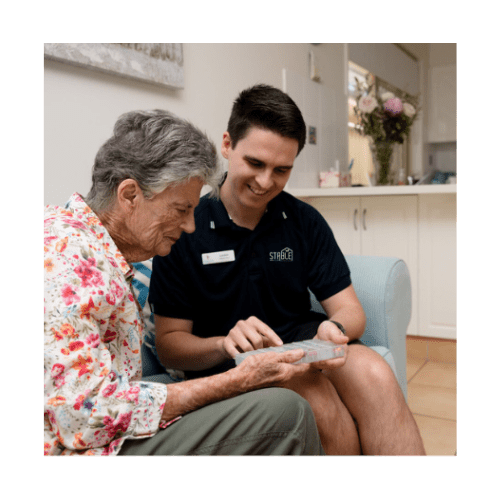The Expanding Demand for In Home Treatment Givers: Reasons Family Members Choose Expert Treatment Over Standard Facilities
The boosting choice for in-home caretakers over conventional facilities is a substantial trend improving the landscape of senior care. Family members are drawn to the benefits of individualized care that straightens with specific needs and preferences, allowing elders to keep a feeling of autonomy in an acquainted environment. This shift likewise highlights the psychological and monetary considerations that influence decision-making. As we discover the myriad factors adding to this growing demand, the effects for both family members and caregivers end up being significantly noticeable. What does this mean for the future of caregiving?
Customization of Treatment
Customization of treatment in home caregiving is essential for meeting the distinct needs of each individual (in home caregivers). This technique makes sure that treatment strategies are customized to the certain demands of the individual, considering their clinical history, personal choices, and way of life. By concentrating on the individual's special conditions, caregivers can foster a sense of self-respect and freedom, which is frequently doing not have in even more institutionalized setups

Home caregiving enables for continual monitoring and modification of care methods, making sure that adjustments in wellness standing or personal choices are promptly resolved. Inevitably, individualized treatment in home settings significantly contributes to the total health of customers, making it an essential component of contemporary caregiving methods.
Comfort of Home Environment
The convenience of a home environment plays a vital function in the efficiency of home caregiving. Numerous people, particularly elders, experience enhanced anxiety and anxiousness when positioned in strange settings such as conventional care facilities. Home caregiving offers an acquainted environment, full of personal possessions, valued memories, and the complacency that comes from being in one's very own area. This familiarity can considerably boost psychological well-being, which is vital for recuperation and total health and wellness.
Furthermore, the home setting enables for a customized method to caregiving, accommodating specific preferences and routines. Families can create an environment that reflects their liked one's way of living, guaranteeing that treatment is supplied in a manner that really feels comfy and all-natural. This individualized setting motivates far better communication and communication in between clients and caretakers, promoting trust and connection important for reliable care.
Furthermore, the comfort of home can assist in social links, as member of the family and friends can check out extra easily, supplying essential psychological assistance. ndis support coordinator. On the whole, the home setting not just helps to maintain self-respect and freedom yet additionally adds to a higher high quality of treatment, making it a recommended selection for families seeking expert caregiving options

Enhanced Independence for Elders
Home caregiving not only provides comfort but also advertises boosted self-reliance for seniors. Unlike typical facilities, at home care allows elders to maintain their everyday routines and take part in acquainted activities within their own environment. This freedom is critical for their emotional health and total lifestyle.

In addition, in-home caregivers can adapt their services to cater especially to the special demands of each senior, advertising a higher feeling of control. This versatility makes sure that senior citizens can enjoy their pastimes, socialize with friends and family, and continue to be active in their areas, even more boosting their feeling of self-reliance.
Inevitably, in-home caregiving not just deals with the physical demands of senior citizens yet likewise encourages them to lead meeting lives, making it a progressively prominent selection for this page families seeking the ideal care remedies for their loved ones.
Cost-Effectiveness of In-Home Care
In-home care supplies an economical choice to conventional nursing centers, enabling family members to offer top quality assistance for their liked ones without sustaining excessively high expenses. The costs linked with assisted living facility can be overwhelming, commonly going beyond why not find out more $100,000 annually, which can drain funds quickly. On the other hand, in-home treatment services normally charge on a per-visit or per hour basis, making it possible for family members to tailor treatment plans according to their budget plan and details demands.
In addition, at home care eliminates additional prices related to facility living, such as transport, board and area, and different management costs. Families can choose to involve caregivers only when necessary, potentially decreasing overall expenditures. A considerable advantage of in-home treatment is the ability to preserve personal routines, which can add to far better psychological wellness and decrease the need for pricey clinical treatments arising from abrupt lifestyle adjustments.
Insurance coverage, consisting of long-lasting care insurance policy, frequently reaches at home care solutions, even more improving financial accessibility (home care providers). Overall, the cost-effectiveness of in-home care not only reduces the financial concern on households however likewise promotes a much more personalized strategy to care that lines up with specific choices and requirements
Structure Stronger Household Links
Supplying care in a familiar atmosphere cultivates deeper family members links, enabling enjoyed ones to actively take part in the caregiving process. In-home treatment creates possibilities for households to involve meaningfully with their senior or handicapped family members, advertising psychological bonds that can be hard to achieve in institutional setups. The visibility of professional caregivers allows household members to concentrate on their relational duties as opposed to being strained by the physical needs of treatment.
In addition, in-home treatment permits families to maintain their valued regimens, which can diminish feelings of stress and anxiety and disorientation often connected with relocation to care centers. Shared dishes, acquainted environments, and the comfort of home supply a feeling of stability that enhances wellness and promotes open interaction.
Families can collaborate with caregivers to develop individualized care plans that show the specific preferences and needs of their loved ones. This collaborative technique not only encourages the senior yet additionally reinforces the family system, as participants share Read Full Report obligations and sustain each other with tough times. Inevitably, at home treatment grows a caring environment where partnerships can grow, boosting the lifestyle for both caretakers and receivers.
Conclusion
The raising preference for at home caregivers highlights a substantial shift in just how households come close to senior treatment. As these variables straighten, at home treatment emerges as a compelling choice to typical facilities, inevitably promoting the wellness and high quality of life for seniors.
Family members are drawn to the advantages of individualized care that lines up with individual requirements and choices, allowing seniors to preserve a feeling of autonomy in a familiar setting.At home care offers a cost-efficient alternative to conventional nursing facilities, allowing households to give quality support for their liked ones without sustaining excessively high expenses. In contrast, in-home care solutions generally charge on a per-visit or per hour basis, making it possible for families to customize treatment strategies according to their spending plan and details demands.
In-home care develops chances for households to engage meaningfully with their elderly or handicapped loved ones, advertising psychological bonds that can be hard to attain in institutional setups.The enhancing choice for in-home caregivers highlights a considerable shift in just how family members come close to elderly treatment.